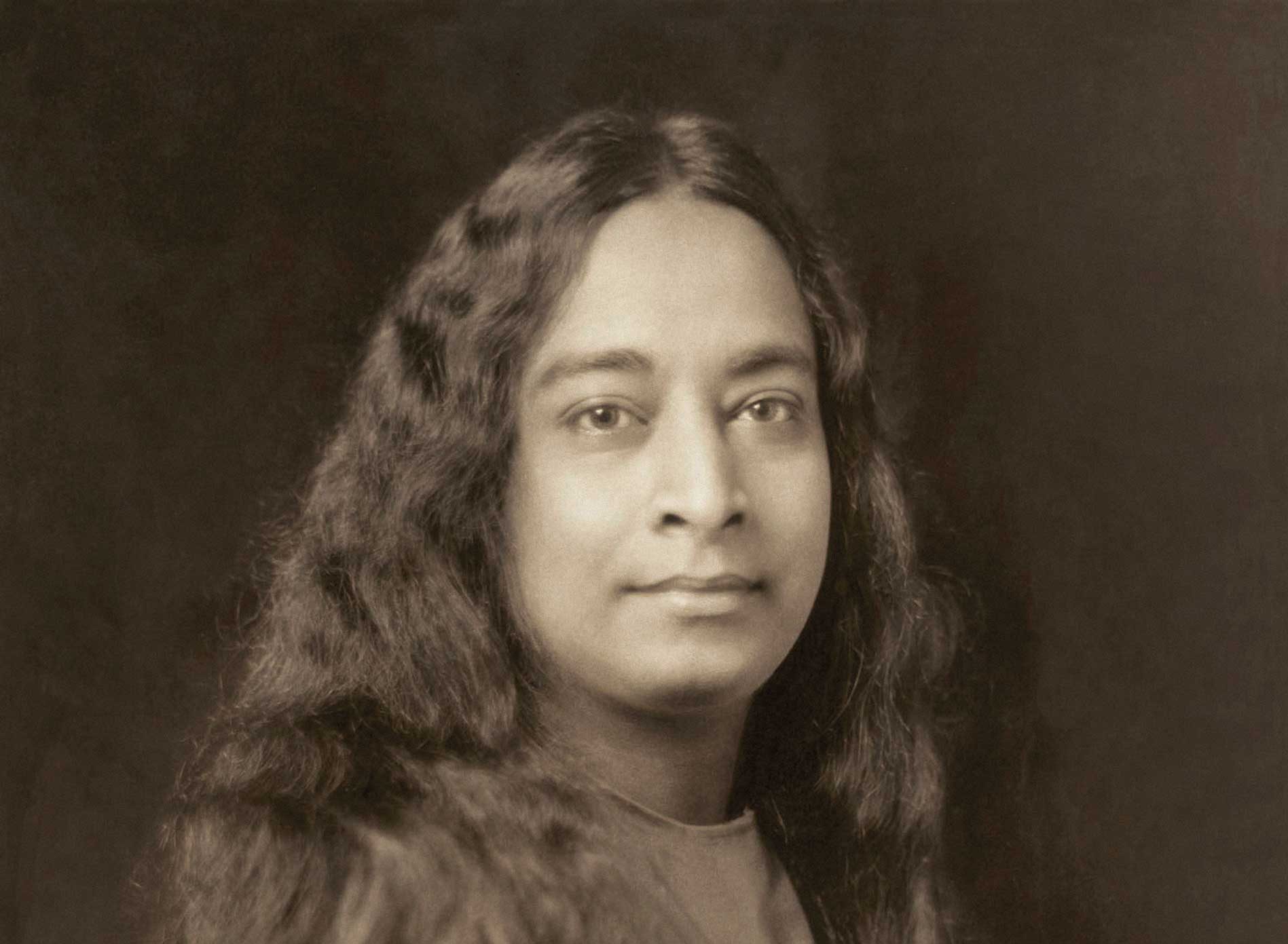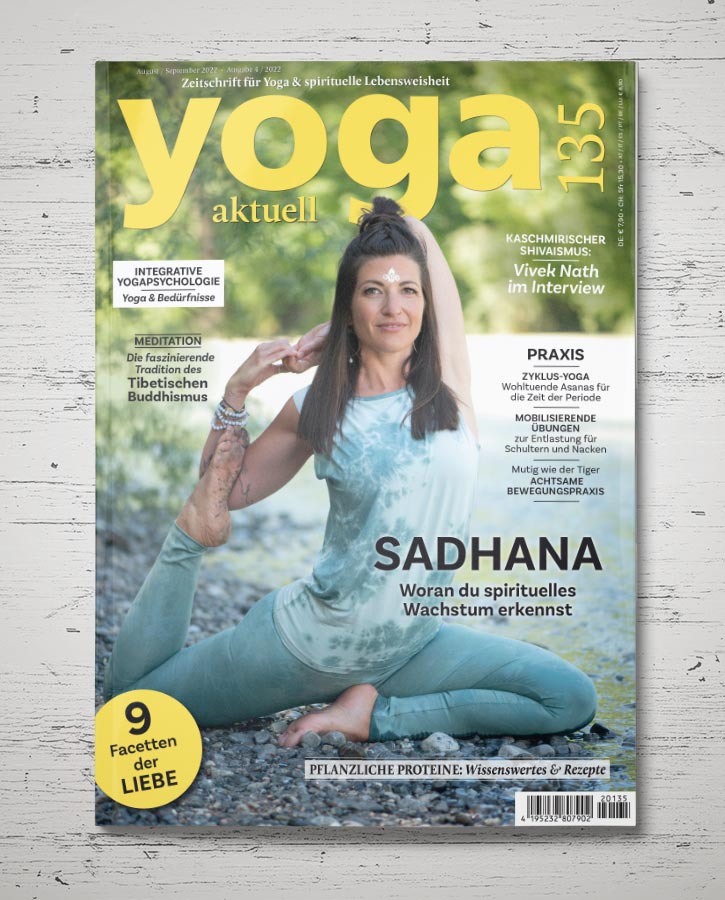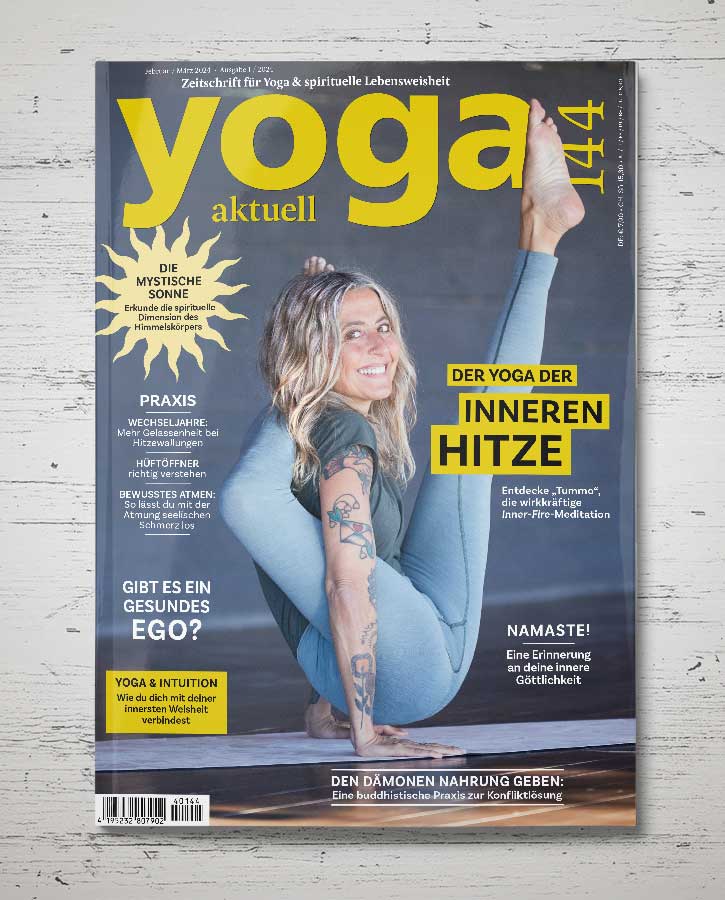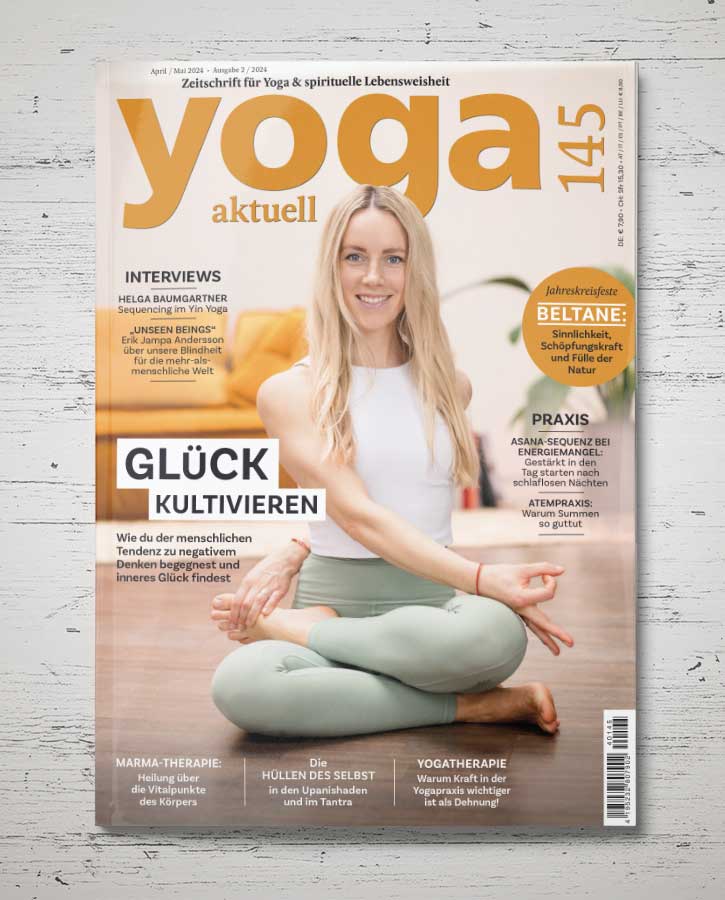Intuition is a precious faculty – in various ways, especially in today’s world. How can we enhance our intuition and ensure that it remains undistorted, avoiding the loss of our connection to it? YOGA AKTUELL discussed this topic with Sister Nandini from the Self-Realization Fellowship, whose founder Paramahansa Yogananda consistently offered valuable insights on this subject.
INTERVIEW
YOGA AKTUELL: Let’s start with a short definition of intuition. How would you put it?
Sister Nandini: Intuition is the universal inner feeling by which you know at once the truth about anything. It transcends thinking. It doesn’t depend on any data from the five senses, and that’s why it is called “the sixth sense”. Intuition is a faculty of the soul, and the soul is a ray of Spirit, or God. Paramahansa Yogananda explained that Spirit has no eyes, ears or mind that depend on the senses. Spirit has the all-knowing power of intuition, and by this power God knows instantly anything He wants to know. And through this omnipresent power, God has the power to see, hear, smell, taste, and touch anything, anywhere. And since we are made in the image of the Divine, we have the same power within our souls. We only have to tap into it. Everyone demonstrates the power of intuition, more or less – it often peeps forth in moments of calmness that we may have amidst all our thoughts and sensory perceptions.
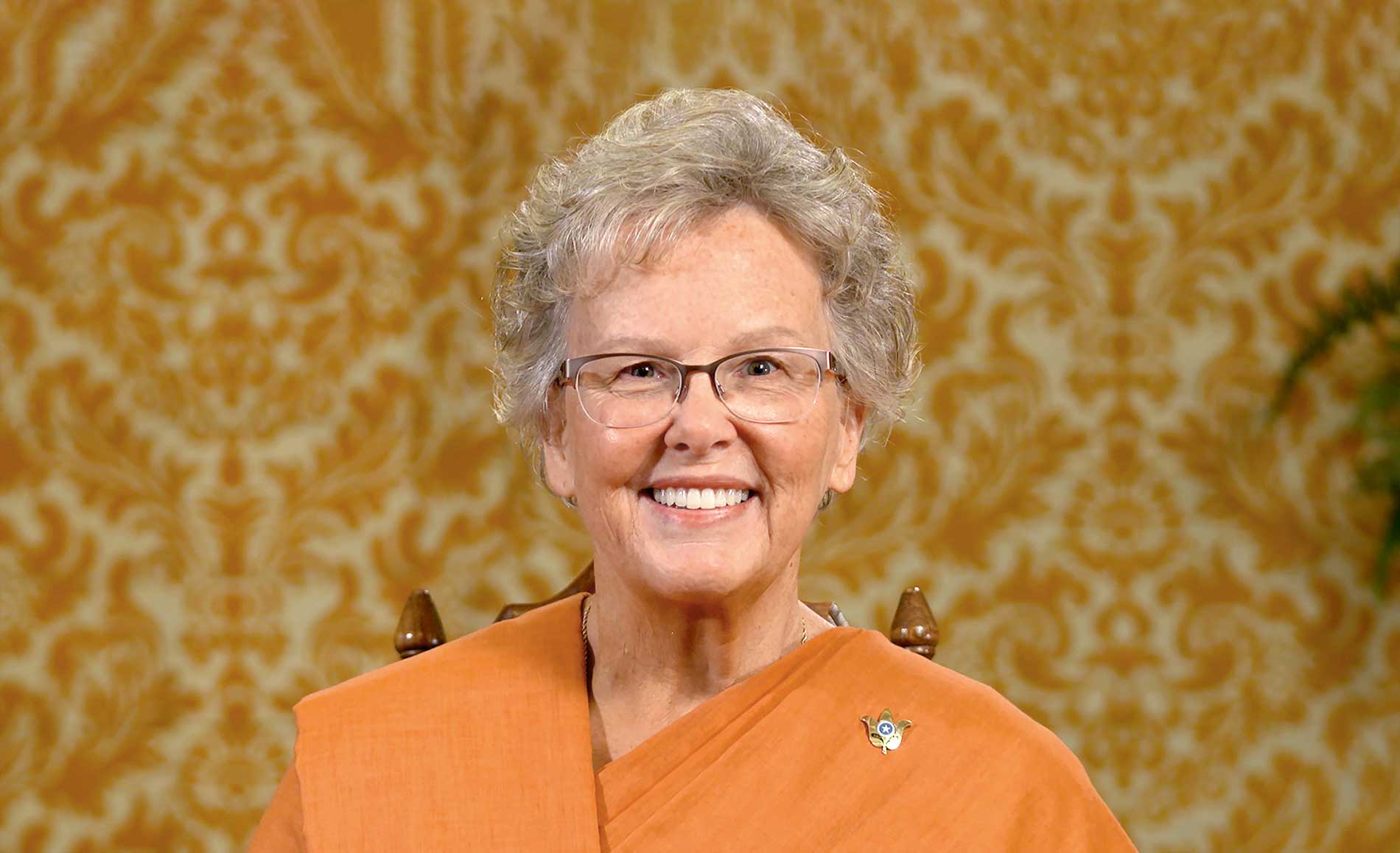
So we all have it inside of us. However, it seems it can be blocked or diluted. What do you think are the reasons that many people even feel completely detached from their intuition? Is it also the latest technologies that can affect us here?
As I mentioned, as human beings we were created as omniscient as Spirit, but maya – cosmic delusion – has convinced us to focus on this material plane and, out of habit, our whole attention is normally focused on the sensations pouring in through the sensory nerves and this keeps our mind filled with noisy thoughts. Our minds are like a mirror, moving all the time with restlessness. And when the mind is busy with thoughts and emotions, it distorts the facts right in front of us. It veils the soul’s true knowledge which is born of intuition. On the one hand, that modern technology is wonderful. Without it, we wouldn’t be speaking today across continents with such ease and accessibility, and it is so easy to be able to go online and instantly find answers to our questions. For anyone who is older, I remember how meaningful it was to go out and consult the encyclopedia for answers, but those days are long gone. Knowledge is outdated before books are even printed. But technology becomes a problem when it is used habitually, to the point that we become addicted. Addictions are subtle and, of course, they’re very enticing. Social media, gaming, even video and news sites are designed to be attractive and draw you in. Even if you aren’t addicted, it is easy to get very distracted – and, to put it bluntly, waste a lot of time. Now, that’s not to say we can’t ever take a break – who doesn’t appreciate a video of adorable puppies and kittens, or something that makes you laugh? But we have to keep in mind maya (delusion) is always there, trying to snatch our time, trying to bring our attention outward. This is not where true joy is to be found. True joy is found within our soul, and it is in this joy of the soul that intuition is found.
Sometimes we are even convinced that we are acting on our intuition while it is actually our patterns instead that bring about our assumptions and choices. How can we discern between real intuition and all those inner programs we might mistake for it?
You are right. We have to be careful to distinguish between inner guidance and the promptings of our ego. You know, when making a decision or taking an action, it helps to ask yourself if you are doing it through understanding or through some misguided emotion such as fear or anger, or because of some prejudicial influence on your mind. And if there is an emotion or prejudice, your own understanding will be unclear, so you have to watch out for habits of thinking and judging in a particular way. Watch out for a strong desire that something be a certain way. Watch out for deeply held prejudices. And especially, watch out for overconfidence in your cleverness or shrewdness. If your ego is blind and has a strong voice, it may drown out intuition and mislead you. But if you seek to please God in your efforts to do something worthwhile, He will guide your intuition from error to good. So the right way to work towards success is to try to please God and then do your best. And then? Remain flexible. Pray to God. A prayer that I like is: “It seems to me this is the right way to go, but if at any time, Lord, you show me that I’ve made the wrong choice, I can step back and make corrections.”
And yet, sometimes we tend to be stubborn and want to have things our way, so we are not always willing to be flexible and to listen to guidance – which again may be due to certain patterns that drive us. Do we also need some kind of shadow work to become more familiar with them, so they don’t mingle with our intuition so easily?
Although you haven’t brought this up specifically, I would like to address the issue of emotional or mental problems such as anxiety, depression, and so forth. For anyone struggling with such feelings, I want to emphasize please never feel that you must be able to handle all problems with yoga practices alone. Until we have realized our oneness with God, Paramahansa Yogananda encouraged us to be practical. Seek the doctor’s guidance for problems with the body: God works through the doctors. And the same would be true for mental and emotional difficulties: seek professional help if you are feeling overwhelmed and struggling with emotional issues. Now, what kind of professional? As a minister, I wouldn’t presume to tell someone to seek this kind of doctor or pursue that kind of work or therapy. It is not my expertise. What I would encourage you to do is think and pray about it. Ask God’s guidance. Take the next step to get help. And then think and pray some more. Those are the basic steps all of us can take to access our intuition and move forward with any problem we are facing.
At the same time, for all of us it is very helpful to set aside time at the end of each day for introspection. Sit and analyze your thoughts and behavior of that day as if you were a disinterested observer. Paramahansa Yogananda said that through the practice of introspection and self-analysis we actually begin to expand our power of intuitive knowing. He said: “Introspection is that power of intuition by which the consciousness can watch its thoughts. It does not reason, it feels—not with biased emotion, but with clear, calm intuition.” Intuition is the knowing that informs us as to the nature of thoughts and sensations and feelings present in the mind. Discerning introspection is the ability to stand aside, to observe oneself without any prejudice and to judge accurately. And as you meditate, your intuition grows and you are able to introspect at a deeper level and see wrong habits of thinking and action more clearly.
We need to be very brave for this kind of introspection. You mentioned the importance of being non-judging, but many of us have the habit to be quite harsh against ourselves. So do you have any advice as to how we can learn to be more patient with ourselves and more forgiving?
Introspection doesn’t mean that we should beat ourselves up, right? God has such compassion for us, and we need to have compassion for ourselves, too. You take someone who is looking at a business, and they may see: “Oh, this part of the business isn’t going very well.” Do they beat themselves up? No, they just analyze and say: “What can we change? What do we need to do to make this part more successful?” And that is the same attitude we need to have with ourselves. This is what we mean about being dispassionate. We need to love ourselves and be patient with ourselves. It doesn’t mean we need to be perfect. Of course not. We are all walking the path. But we all want to grow, right? So how do we do that? Ask your inner Self: “How can I take the next step? Guide me to take the next step. And then the next step.” And then how rewarding it is to work with God. If you have a guru, work with your guru to grow and to feel happier within yourself, giving to the world those things that you want to give – more joy, more wisdom, more love.
How can we get in touch with our intuition and how can we develop it in ways that it becomes constantly present in us?
There are so many practices we can incorporate into our daily life, and they all help strengthen our intuition. One of the first things I want to say is: When you live truth, you have the ability to see truth. And that is why truth, satya, is among the foundational principles of yoga. The reason is practical as well as metaphysical. And so how do we live truth? It is by listening to and following our voice of conscience.
Another way to develop intuition is by endeavoring to keep the mind free from prejudices. We have talked about this a little already. You know, most people do not act out of understanding but according to their moods. And prejudices also blur our vision and distort our understanding. They prevent us from seeing clearly. It really helps to have a spiritual teacher or teaching to show you how to analyze and correct your thoughts. As Yogananda said, the great ones who have fellowship with God have real understanding. Souls who are of the Divine have clarified their understanding by attunement with God’s wisdom. As we strive to be more in tune with the divine ones and study their teachings, beneficial changes take place within us through their blessings. So it helps to attune yourself to the Great Ones, to read their scriptures and their teachings.
Another way that we can develop our intuition is to endeavor to balance reason and feeling. In this plane of duality, there can’t be light without dark, wisdom without ignorance, joy without sorrow. In the same way, in this plane the all-knowing intuition of the soul becomes differentiated into reason and feeling. Whereas ego-driven emotion and understanding guided solely by the intellect can lead you to do the wrong thing, understanding governed by both heart and head leads to intuition, and then you have a clear vision to see yourself and others.
And yet another way to develop intuition is by deep thinking and activity in one direction. Intense effort in concentration draws the attention inward. You may have experienced it when you were deeply concentrating. You didn’t hear what someone said. That kind of deep, calm focus develops intuition. It is how an inventor, when his concentration is right, will see intuitively the idea for his invention. One of the most important ways to deepen our intuition is to develop calmness. Sri Daya Mata, the third president of SRF, quoted Paramahansa Yogananda as saying:: „Remain calm, and then suddenly a great feeling will come over you and your intuition will point you to the right step you should take at that time. If your mind and emotions are calm and attuned to the voice of intuition within, you will be rightly guided. In your everyday life, you will meet the right people who will bring some solution to your problem, or who will help you in some way–or through their contact and counsel, you will find the right way.“ But how do we achieve calmness if we are feeling worried or overwhelmed? One solution is: Go to sleep. It’s true. Yogananda explains that when we are in deep sleep, we are in the tranquil super-consciousness, a place where there are no fears, no worries. You have heard the expression “Let me sleep on it.” There’s wisdom in that! So go to sleep and then, before you begin your day’s activities, when the mind is fresh and rested and has been temporarily cut off from daily troubles, meditate. And at the end of meditation, ask the questions you want answered. Of course, we don’t have to go to sleep every time we want to become peaceful. Faithful practice of deep meditation is the best way to divert the attention from worry and other emotions, to a state of absolute peace. And as we meditate with patience and persistence, gradually, in that inner communion of the soul with God, intuition unfolds.
This is a lot of profound advice! My last question is about an issue that many of us might have experienced at times. When we are almost desperately searching for certain answers, meditating hour after hour to find them, those insights we are seeking often just seem to be locked. How can we keep ourselves from desperately chasing answers in order to truly surrender to the process of letting them come to us naturally?
All of us yearn to have the secret key that unlocks all the answers, and that yearning for truth is very important for us to grow spiritually. But we have to remember when we are meditating that this is not the time to be thinking about problems and seeking answers. Meditation is the time to go deep within. The breath becomes calm and quiet, and you begin to feel the peace and joy of the soul. If worries creep into your meditation – and this happens to all of us at one time or another – you can use breath and pranayama to calm unwanted emotions. As Yogananda explained: “Quick or uneven breaths are an inevitable accompaniment of harmful emotional states: fear, lust, anger.” He also said “Scrutinize the thoughts and feelings generated in you by changes in the depth or rhythm of the breath.” I’d like to share with you one of the techniques that Yogananda taught for releasing unwanted emotions and impulses: “Contract all the muscles in the body and retain the tension; inhale and hold the breath. Feel that your breath is absorbing the emotion, drawing it out of your nerves and brain. Then relax the muscles and exhale the breath, feeling and visualizing that the fear, anger, greed, or whatever emotion was troubling you has left your body along with the energy and breath that you released with your relaxation and exhalation.” Then after you have calmed your emotions, if you know techniques of meditation, this is the time to practice them to go deeper into the silence. If you don’t know any meditation techniques, you can simply lift your eyes to the Christ center – the center of will and concentration at the point between the eyebrows – and at the same time sit very still. While the eyes are lifted to the Christ center, concentrate at the heart center and remain watching the heart, trying to be aware of the feelings that are flowing from that center. Then, after you have had a period of stillness, that is the time to talk to God about your problems. Concentrate both on the point between the eyebrows and on the heart, and ask God to direct your intuition so you may know what to do about your problems. A wonderful prayer of Yogananda’s is: “Heavenly Father, I will reason, I will will, I will act; but guide Thou my reason, will, and activity to the right thing that I should do.” Yogananda also suggested that in the beginning we should try to find solutions to smaller problems, and then when we are successful in doing that, we can employ our intuition to solve big problems.
About surrendering to the whole process of seeking answers: It may help to remind yourself often that God never gives you more than you have the strength to handle. And right now – this moment – is your opportunity to grow. That means whatever you are going through in this moment, whether it is struggles and challenges, lack of direction, perhaps even pain, you can trust that it is coming to you for a reason. You don’t have to know the reason, but only open your heart to God’s love and help. And each time you do this, it deepens your relationship with God until you not only believe, but you know and feel: “God is here, supporting me, guiding me always.” He loves us unconditionally. I want to add a final word of encouragement about cultivating intuition. Sri Daya Mata quoted Paramahansa Yogananda as saying: „Just as one moon gives more light than all the stars, so, as you develop spiritually in intuitive realization of Truth, or God, you spread more light of good and truth than many ordinary mentalities put together.“ We need more light in this world and everyone who is striving to walk the spiritual path is a channel for God’s love and peace.
It has been a pleasure to be a part of this interview!
| For more information about Self-Realization Fellowship and the teachings of Paramahansa Yogananda, please visit: yogananda.org |


